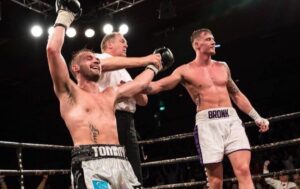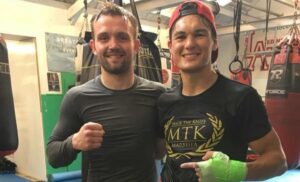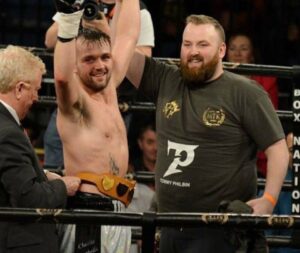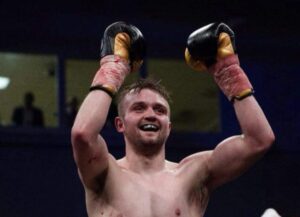Featured image by: Colin Poultney
As one eye slowly peels itself open in an attempt to face the day, the other questions its motives. Those gangly limbs that used to dance and haul you from exciting ventures, now seem heavy and uninterested. It’s a ten-count of its own, depression.
Every morning, the desire to stay trapped in bed, protected from other people and cut off from the outside world, generally outweighs that former enthusiasm. It wasn’t the outside world that had the issue, though.
Would today be a good day? Or do the grey, dreicht skies indicate a thick fog in our midst? The thoughts and feelings of those battling certain mental health conditions can change like the wind. From the calm, peaceful and gentle breeze to an angry and unpredictable jolt.
“It’s this whole thing of boxing being for tough guys. But I’ve gret [cried] more in the last two years than I ever have in my life” explained unbeaten super-middleweight, Tommy Philbin (11-0, 4KOs).

“I’ll tell you a wee secret as well, when I was young people used to call me ‘Bubbles’ cos I used to cry all the time (laughs)! The last couple of years has been a fucking nightmare. I think that’s what it is, maybe I should have went earlier but I didn’t know what it was.
“Me, my missus and my kids always go to Glasgow over Christmas and New Year time, every single year. We went and when we were coming back, my missus said to me, ‘Did you enjoy yourself?’ I think I said aye, but she said, ‘Not as much as you used to’. I think she was maybe thinking there was something wrong with us, but it was just me. It was when I was starting to get really, really bad and it was that whole tough guy thing – I didn’t wantae tell anybody.”
Tommy was years past the ‘Bubbles’ era, bottling up emotion and combining it with a relentless schedule, all in the hopes of making his boxing career a success. He’d fought on bigger shows, capturing the Celtic title against Rhys Pagan – who was later rewarded for the loss with a shot at the WBO European title – a fine example of the sport’s complex, political landscape.

Now, aged twenty-eight, he seemed keen to return to the ring after balancing himself, mentally and physically. I caught him in the middle of a family movie, Spy Kids 3D. As he tried to sneak away for peace in another room, Philbin revealed his time off was rewarding, yet tainted. In the loneliest of athletic quests, even his children had experienced his recent lows.
“Sometimes I hate myself, because when I’m not right and I’m in my bad mindset, then I don’t speak. I just want to sleep. My kids are only five and six, they don’t know what’s wrong, but they can tell something is wrong. When I’m having a good day, they’re all around me and stuff, but when I’m not having a good day, they don’t want to play and they don’t come near me much.”
He continued, openly, “They must get a vibe when I don’t want to speak and I’m just on the couch… Not wanting to be alive sometimes, as stupid as it sounds. My kids just come up and lie beside me, they don’t say much. The last six months has been good, but when I fight, listen the money hasn’t been great, but when I get the money I’ll always take them to the toy shop or treat them afterwards.
“My son really wants to go to Legoland and both of them want to go to Disneyland, so if I was to get a shot at the British title, I could afford to take them there. My missus and my kids just mean the world to me.”

That British title and subsequent trips to both destinations, didn’t seem unrealistic for a man currently ranked tenth in the UK. The division is experiencing a transition, with big names such as George Groves and James DeGale deciding to hang up their gloves. Tommy was adamant he’d soon be boxing again, which notably changed his tone after marking almost a full year out.
It’s an addiction, boxing. It’s been said time-and-time again. From the tough sessions at his maiden amateur gym, Leith Victoria, to travelling the world with fellow Scots John Thain and Josh Taylor, Philbin had lived it. He told me of visiting Canada, Russia and Finland – not every Edinburgh teenager’s regular holiday destination during half-term.
“It’s the old cliche, I was getting in trouble at school. I never used to cause trouble but if trouble came my way, I wouldn’t be scared to stand up for myself. I dunno why, but people used to always start stuff, I must have had one of those faces! I was only young, maybe eight or nine. My Dad said, ‘I’ll take you to the boxing gym, I used to box!’ I never really believed him!
“I wish I’d taken it a little bit more serious [as an amateur], cos I’d run maybe once-a-week or something like that. Until I moved to Lochend ABC, when I was eighteen, then a whole different mindset took over. I really started to commit myself. My goal was always to turn pro. I thought, I’ve been doing it for that long, I may as well turn pro and make something of myself. I always thought being an amateur was like your apprenticeship and being a professional is when you really need to knuckle down.”

Despite keeping a low-profile, Philbin had amassed over one hundred amateur fights, which was impressive in an age where professional boxers educate themselves on the unlicensed or white collar scenes. I was there when he fought for the last time, in Glasgow’s SSE Hydro on the undercard of Josh Taylor v Viktor Postol. To see him walking out, gleaming from ear-to-ear, was to know that Tommy was at home.
With four knockouts on his record, all had come within his previous five fights. As he matured he had seemingly unlocked his natural punching power, moving from four-rounds to ten. It’s so often seen amongst small hall boxing, away fighters turning up to survive in order to secure another bout in two week’s time. If they’re stopped, then so are their purses for at least a month – far from ideal for a man on the road.
“To be honest, I put that [recent run of stoppages] more down to the opponents. If the opponent is coming in to survive, it’s hard as anything, but if the opponent is taking risks and trying to hit you, there’s opportunities there. I’m no’ a massive, massive puncher – but I can punch a bit. If they’re leaving themselves open a bit, I know I can get them out of there. I can hurt these guys, but they’re survivors, so it’s hard to get them out of there.”
Tommy continued, discussing his goals, “I would like to win the British title outright and win the Commonwealth title. If I was to win both of those, I’d be fucking over the moon! To win the British title outright, every day would be a dream come true. I just wanna see how far I can take it really.”
“I’ve been boxing since I was nine, I’m now twenty-eight coming up on twenty-nine, so it’s a long time doing it. I just wantae achieve something that I can be proud of. I won a Celtic title. It’s still a good thing, but it’s not a British title. That British title is, ‘Wow!’ Can you imagine walking into yer house every day and seeing that on the mantle piece? If I won that and couldn’t ever box again, if I had to retire, I’d still retire happy.”

It didn’t seem important at this stage, which belt Philbin captured or how much he achieved. His priority was solely coming back to the sport which he thought had earned him the respect of his family and friends. He already had it. He’s sold tickets and built a loyal band of followers, but when the sport fizzles out, where would they be? Those hundreds of booming voices, slowly echoing into the distance, as they have for so many other popular fighters.
As he plots his return in the summer, he offered a stark reminder that his battle with depression is ongoing, as it is for many involved in boxing, whether diagnosed or suffering in silence.
“I got admitted into hospital because I was so close to doing something so stupid… But yeah, with the help of doctors and my family members, but mostly my missus [I am on the mend]. I’m not better yet, but I’m getting there. I just need to fight again. I think if I can just fight again, it would be brilliant.
“I posted a picture on my Instagram of me sparring with one of my gymmates and one of my management team got in touch and said, ‘Good to see you back sparring!’ I told him that I wanted to get back fighting and he said, ‘When will you be ready? We could have something for you!’ So, I’m aiming to be ready for about May. He has a show in June. If they can get me out before that, then great, but if they canny’ then it should be June 21st.”

Philbin had been asked to fight for his beloved Lonsdale title in November, eventually being replaced by South London’s Darryll Williams, who was cheated by the judges on the night.
It wasn’t his time then, but from hearing him discuss the sport with passion, he was ready to push for those solid, domestic honours he’d visualised taking pride-of-place above the fire at home. John Ryder, Jamie Cox, Chris Eubank Jr – he’d fight any of them. But that’s why boxers have trainers and managers, as he explained his coach had dismissed the Parker fight following a breakdown in sparring.
Whenever Tommy Philbin returns to boxing, it will signal a victory for those battling mental health conditions. He is a good man, a father and a loving partner. He is a fighter. He wandered back through to his two beautiful children and finished watching their film of choice, thankful and blessed. Depression couldn’t be knocked out, it seemed, but it could be outworked and taken the distance, with the support of a loving corner.

Most importantly, it’s good to talk and Tommy encouraged others to do the same.
“I would say, first and foremost, just get help. Go to your doctor. Don’t hide it away because it’s the worst thing to hide it away. Loads of people ask me if I’m quiet at work or whatever, they’ll ask if I’m alright – cos they all know, as well. Everybody knows. It’s nice, but sometimes you just wantae go in a wee shell. I’d say definitely get help and if there’s something you’re unhappy with, then change it. I wasn’t unhappy, but I was just doing far too much with boxing and with work. I’ve taken a wee step back and changed things. I’ve changed my job, so I don’t do those crazy hours. Just get help and start to change what you’re unhappy about.
“Boxing is massively important because the last six months to a year, I’ve thought about quitting every two days. I’m being serious. I say, ‘I’m gonnae quit, I canny do this’ and then I’m back in the gym. God help me when I have to retire, because I’ll be devastated. I guess I’ll have to remain in boxing because I’ve done it that long, I couldn’t not have it in my life! It’s become an addiction. Sometimes you love it, sometimes you hate it, but it’s so important to me.”
Article by: Craig Scott
Follow Craig on Twitter at: @craigscott209